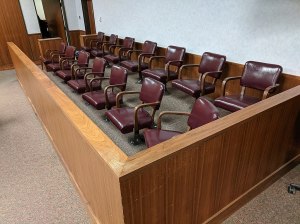I have a jury duty summons for July. In California, I’ll check my county’s website a few days before that date to find out if I must report in person at the Alameda County Courthouse in downtown Oakland. In the past, I’ve reported several times, only to be told later that morning to go home. A few times I’ve made it into the jury pool, which means a trip to the courtroom to find out more. In a couple of instances, it’s been a civil matter.
I always figured if I was going to be on a jury, at least make it something interesting. More than a decade ago, it was.
On that morning, the jury pool was large, with people crowding the first-floor jury reporting room. To me, that said this was a serious case. We were summoned to the courtroom in groups and informed that this was a murder trial, with two defendants.
Back in the jury room, we filled out long questionnaires. Those who felt they had a good reason for not serving on the jury were told they would have the opportunity that afternoon to discuss their situations with the Superior Court judge presiding over the trial. The jury pool of 150 people, we were told, would be cut down to 75 people. Then a series of interviews to be held the following week would winnow down the pool, leaving twelve jurors and three alternates.
I have no objection to serving on a jury. It’s my duty as a citizen. At that time, I’d never had the opportunity before. But I thought my status as a writer of crime fiction would disqualify me. In fact, a few years later, when I was summoned to the courtroom for another murder trial, the defense attorney in that case dismissed me from the pool in record time.
But this earlier case was different. I made the first cut and was called back the following week for jury interviews.
The judge informed us that this was not a case where the jury would determine who killed the victim. One defendant had already confessed. The jury’s job was to determine whether this killing was murder in the first or second degree, or whether it was manslaughter, voluntary or involuntary. The jury would also determine whether the second defendant was an accessory. There were various other charges as well.
The jury interviews were revealing. Some people felt that anyone charged with murder must surely be guilty and that was that. Others revealed prejudices and biases that led to their disqualification. Many felt that they could be open and unbiased, making their decision based on the evidence presented during the trial, despite the fact that many of the witnesses, as we were warned, had various misdemeanor and felony convictions.
During my interview, the judge remarked on my status as a mystery writer. He asked questions about my ability to sift fact from fiction and used this as a springboard for comments about how this wasn’t an episode of a TV show. The defense attorney asked if this case would wind up in one of my books. My answer was frank and truthful. I told the court that everything that occurs in my life is grist for the mill, and I might very well use my juror experiences in fiction.
At that point, I was sure I’d wind up on the jury. I was right. For five weeks, I was in that courtroom, listening to witnesses, or in the jury room upstairs with my fellow jurors, where we were under strict orders not to discuss the case.
The experience made a lasting impression. At the start, I thought the case was going to be straightforward, another senseless killing in a rough neighborhood. But it wasn’t that simple.
I listened to the testimony of witnesses who contradicted each other, making an effort to determine who was telling the truth. I got a sobering picture of the aimless lives of many of the people involved in this case.
Then there were the crime scene photos. Those images will stay with me. They showed the damage done to a human body by a semi-automatic weapon fired a close range.
We the jury – we took our job very seriously. We were aware that we held in our hands the fate of these two defendants.
We spent days deliberating and discussing the evidence. The jury instructions given to us by the judge became our Bible. All the information we needed was there, if only we could parse it out. None of this was easy, or cut-and-dried.
The verdicts? In the case of the first defendant, guilty of voluntary manslaughter and several other charges. Later that year, he was sentenced to thirty years in prison. The second defendant: not guilty of the accessory to murder charge, guilty of several other charges.




I’ve been called several times, but never put on a jury. Just listening to others in the jury pool waiting for something to happen has been an education–and an opportunity. Lots of character details to use in fiction. I’d never thought about how a judge or lawyer might react to a writer. Interesting. Great post.
LikeLike
Another fine post, Janet. I didn’t think being a mystery writer made any difference to the attornies or to the judges, but apparently, it does. I’ve had some near misses with jury duty, but being in “live” theater was an automatic release. The show must go on and all that. I don’t think it counts that I’ve watched every Matlock episode at least twice.
LikeLike
I’ve been summoned multiple times for jury duty but rarely do I get on a jury. I did way back when my kids were in grade school and then near misses recently. I like being on a jury and listening to all the evidence, but having a LEO son-in-law usually gets me off.
LikeLike
I’ve never served on a jury; too many cops in my family. More recently, though, telling the court I’m a mystery writer and that, yes, the trial my find its way into a book has gotten me bounced many times. I’m surprised it didn’t do the same to you.
LikeLike